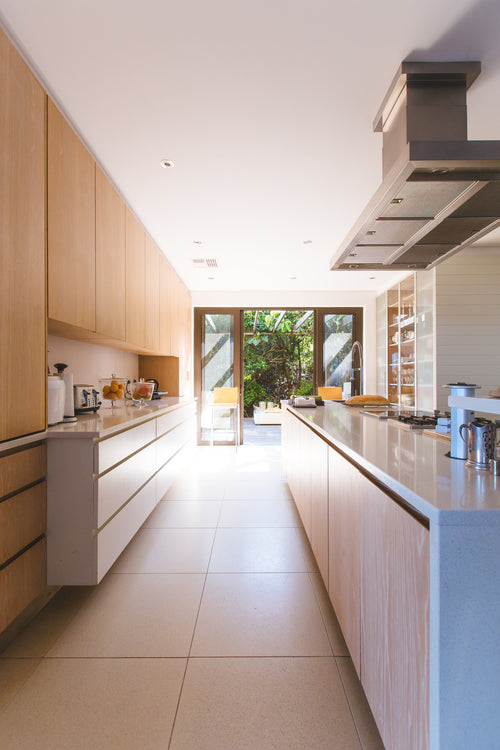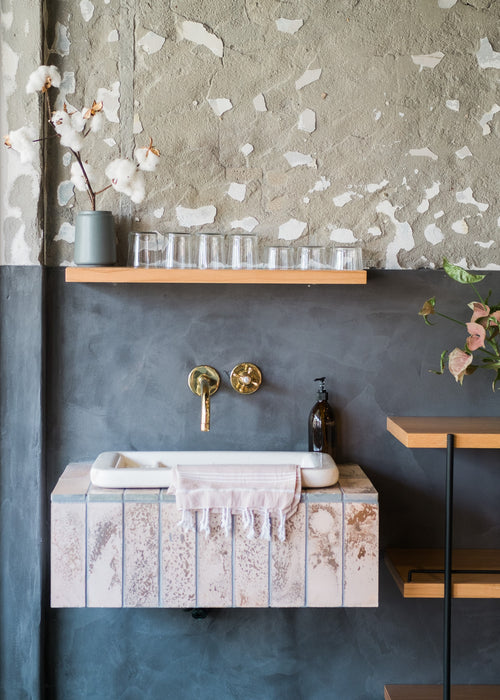CHOOSING THE BEST COUNTERTOP MATERIALS FOR YOUR HOME

One of the most impactful decisions you’ll make about your new home or kitchen is the countertop material you choose. While the deciding factor in choosing a countertop material may be the overall look and design, it’s extremely important to consider the different properties of natural stone countertops, and how they’ll react to certain conditions and wear.
TYPES OF NATURAL STONE FOR COUNTERTOPS
Natural stone material is often selected for countertops because of its durability and beauty. Of course, picking the type of stone to use can be a challenge because the United States does not have standardized guidelines to name stones.
Here are some of the most popular stone materials to consider for your countertops:
Granite
Granite is probably the most popular natural stone used for countertops. It is extremely durable and comes in a wide array of colors, making it ideal for any kitchen design you choose. It has a more speckled appearance than marble and is highly resistant to scratches and stains, making it an excellent choice in kitchens and bathrooms. It sometimes has a beautiful sparkling effect.
Quartzite
Quartzite is a stone that combines the durability of granite with the beauty of marble. It is resistant to stains and abrasions and can be highly polished, making it a good choice if you want countertops that are both lovely and practical. Most natural quartzite is white or gray, but there are other colors available, too.
Marble
Marble has always been prized for its beauty and its ability to take a high shine. Available in many colors, it is a popular choice for countertops However, light-colored marble is susceptible to staining and acid damage unless treated with a protectant. Marble is undeniably impressive and beautiful. It is also one of the most expensive options for your kitchen countertops.
Travertine
Travertine is another beautiful stone that is popular for both kitchen countertops and floors. Its beauty makes it a good choice, but if left unsealed, dirt will get into the natural crevices in the stone. It has the same vulnerability to acid damage as marble but makes a good countertop if it is properly sealed and treated.
Limestone
Limestone is usually light in color and more durable than travertine. It will take a shine, although it won’t appear as highly polished as marble or quartzite. Because it is durable, it makes a good, neutral choice for countertops provided it is treated to prevent staining.
Onyx
Onyx is like a more durable version of travertine and should not be confused with the semi-precious stone of the same name. It’s mostly non-porous and can take a high shine. It can make a dramatic and beautiful countertop if you want your kitchen to make a statement. However, it is very expensive and for that reason, may be best reserved for decorative flourishes rather than an entire countertop.
Slate
Slate is popular for floors but not a particularly good option for countertops. While it is attractive, it is highly porous and susceptible to splitting over time. We think it’s better suited to floors than for kitchen surfaces.
Soapstone
Soapstone has an unusual, soft texture because it contains a high percentage of mineral talc. It makes a good choice if you want a durable and non-porous surface with a unique appearance. Like all stone countertops, it must be properly treated to remain looking its best.
By focusing on the durability and practicality of your countertops first, you can then take considerations of price and appearance into account.
HOW TO SELECT THE BEST COUNTERTOP MATERIAL FOR YOUR HOME
One of the biggest challenges in choosing stone countertops is that it can be difficult to get a true picture of how the surface you choose will look once it is installed. Here are some pointers:
-
Choose a reputable company to buy from. A responsible retailer will want to work with you to ensure you get countertops you love.
-
Try to view the entire slab you’ll be buying – or if that’s not possible, look at similar slabs to get a feel for how the stone will look in your kitchen.
-
Keep in mind that a single tile or small sample may not truly represent the pattern in a stone such as marble or onyx. Something that looks terrific in a 4-inch sample may be overwhelming when it takes up yards of countertop.
-
Be realistic about how you will use your countertops. If you do a lot of cooking, it’s essential to choose a durable and non-porous surface.
-
Be prepared to take care of your countertops. Even the most durable surfaces need protection. All stone countertops must be treated appropriately. Stone sealants provide a layer of protection that can shield your stone countertops from scratches, stains and bacteria. Ideally, you should choose a sealant that is hypoallergenic, anti-microbial, nontoxic and safe for pets and children.



